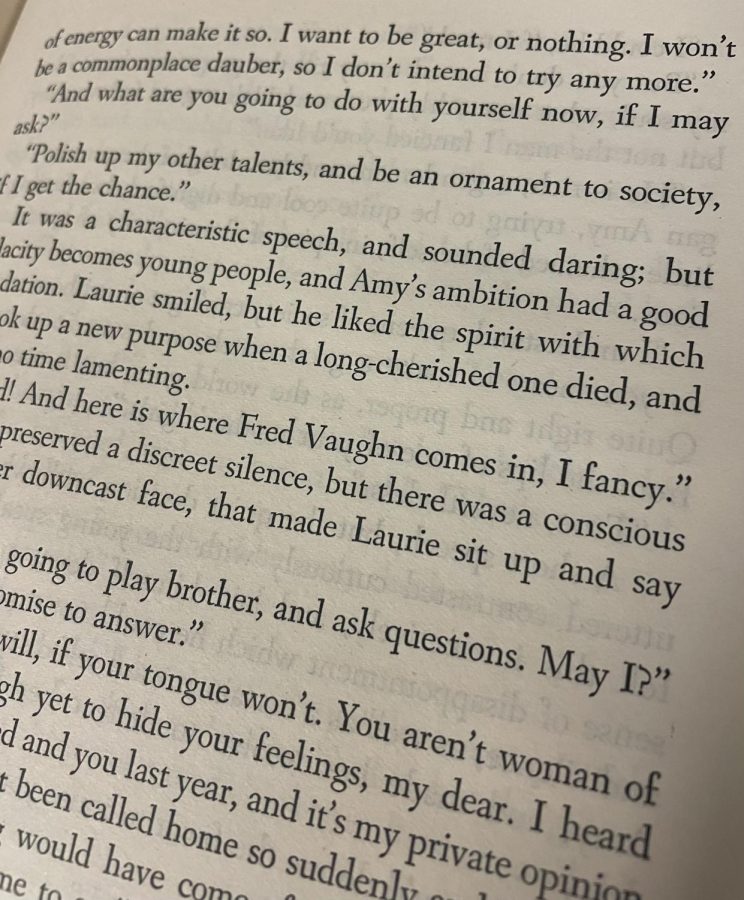Vulnerability and openness: why the difference matters
In her second instalment on vulnerability and openness, Campus Editor Grace Sherban goes in depth on the differences between them.
Mar 31, 2023
This article is the second installment of a two part series on vulnerability and openness. To read part one, click here.
The most prominent example of openness in “Little Women” occurs between Laurie and Jo’s sister Amy. After Jo turns down Laurie’s proposal, he goes on a European vacation which coincides with Amy’s trip. After a chance encounter, the two of them start seeing each other as friends before Laurie embarrasses her by showing up to a party intoxicated.
After coming to her art studio to apologize, Laurie asks Amy how her art is coming along, to which she replies that she has finished pursuing a career as an artist. The two exchange quick remarks about her statement before Amy says, “Talent isn’t genius and no amount of energy can make it so. I want to be great or nothing. I won’t be a common-place dauber so I don’t intend to try anymore.”
Once again, no explanation of mine can compare to the source material so here are links to the movie clip, screenplay and novel. Florence Pugh’s subtle performance elevates this scene and helps make clear what is at the heart of my definition of openness.
Amy’s words carry weight when she reveals the reason as to why she is giving up being an artist, but don’t let this be mistaken for vulnerability. What does Amy have to lose by telling Laurie that she views herself as an average painter? Nothing.
Then again, we can assume that she isn’t going to tell acquaintances at a party the reason she quit painting. Openness is more likely to happen with people we already have an established relationship with or people we are trying to get to know better. Vulnerability occurs when openness fails.
Amy is telling Laurie what she is thinking but not necessarily how she is feeling. She is speaking her own truth while removing any emotional vulnerability. When I watch this scene, I am always shocked to see the lack of emotion from Amy after she decides to give up one of her biggest passions in life. How would you feel if you were to give up on your biggest dream?
Being vulnerable is a choice that most people aren’t willing to make. Instead, Amy can be open about her current experience without having to dig deeper into why. She is saving herself from having to think too hard on the subject while isolating her emotions from Laurie.
The heart of my argument centers around the idea of vulnerability and openness occurring with multiple people but these acts happen internally as well. While the proposal demonstrates vulnerability with others, this scene depicts an unwillingness to be vulnerable with oneself.
Overall, “Little Women” shows both sides of openness and vulnerability in a way that allows audiences to easily identify with the central characters while simultaneously helping prove my whole argument. So, to answer the million dollar question, the difference between vulnerability and openness matters because it shows us who the most important people in our lives are.
Vulnerability is an invitation to let others share in the deepest of emotions. Openness does not allow for this kind of raw exposure of a person’s soul. Trust has to build before vulnerability can occur and it can include sharing something intimate that doesn’t necessarily have anything to do with the confidant. Relationships of reciprocity cultivate the best climate for vulnerability to grow because both parties feel comfortable sharing their thoughts and feelings. Sometimes, when we can’t be vulnerable with who the situation concerns, it’s good to have someone else to confide in.
The distinction between these two principles is one that is often blurred on a daily basis. People can misconstrue a relationship with openness as one that allows for vulnerability which can lead to a tricky situation. Imagine if someone were to suddenly become vulnerable when you view the relationship as being open. Moments where the difference isn’t understood can lead to awkward situations.
To close, I think it is important to take a moment of reflection and think about who we feel comfortable being vulnerable with. On the other hand, is it worth being truly vulnerable when a whole relationship is at stake? That’s a question only you can answer.













